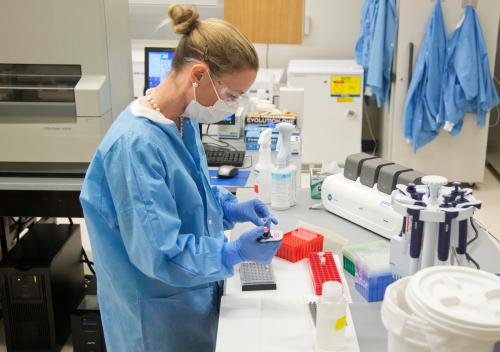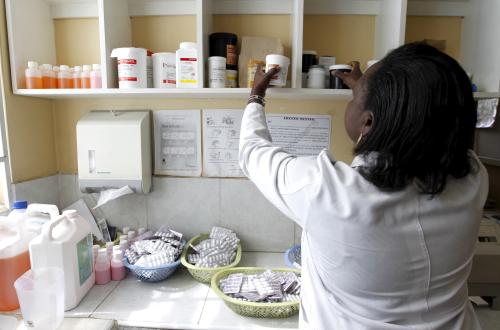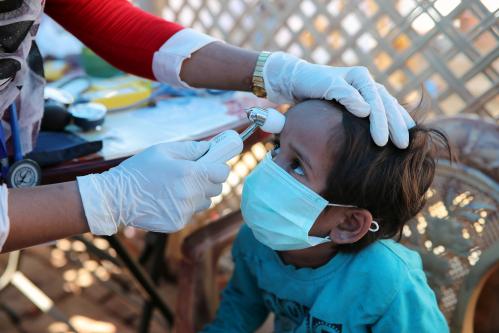The President Donald Trump budget calls for a 24 percent reduction in spending on foreign assistance for global health. These are the U.S. government funds that support efforts abroad to improve disease prevention and treatment. That draconian decrease could spell trouble for the fight against neglected diseases and, if enacted, would pose a serious threat to international stability.
Foreign aid support for global health addresses a wide spectrum of maladies that disproportionately affect the world’s poor, usually in developing nations, and receive a dearth of funding for research & development (R&D) for new treatments.[1] Global health expenditures include spending on the “Big Three” neglected diseases of HIV/AIDs, Malaria, and Tuberculosis, but also lesser-known neglected tropical diseases such as schistosomiasis, chagas, African sleeping sickness, and lymphatic filariasis, among others. Global health also seeks to improve outcomes for childhood and maternal health, constrain the rise of non-communicable diseases and protect against infectious diseases (both known and unknown).
No one can deny that global health funding saves lives and contributes to global political and economic stability. For example, a previously sick individual treated with antiretroviral therapy for HIV/AIDs is in a strong position to become a more productive member of society than those who are untreated. Global health expenditures—whether on prevention, education, vaccination or R&D—represent some of the “best deals in philanthropy.” In fact, as Bill and Melinda Gates state in their foundation’s 2017 annual letter: “For every dollar spent on childhood immunizations, you get $44 in economic benefits.”
Under the Obama Administration’s last fiscal appropriation in February 2016, the U.S. set aside nearly $8.5 billion for global health in FY 2017;[2] under the Trump budget, the U.S. would cut its funding to $6.5 billion in FY 2018, a 24 percent reduction in spending.
To put these numbers in global context, the U.S. contributed nearly one-third of the global spending on Development Assistance for Health (DAH) in 2016. [3] As the pie chart below shows, the U.S. government is the largest single contributor towards DAH. Although some may contend that the U.S. government’s contribution is too large, overall foreign aid only makes up less than 1 percent of our national budget. Indeed, the amount devoted to global health amounts to only 0.22 percent of the entire 2016 budget.
What happens if the U.S. significantly cuts its funding for programs such as the President’s Emergency Fund for AIDs Relief (PEPFAR), the President’s Malaria Initiative (PMI), the U.S. Agency for International Development (USAID), the Center for Disease Control (CDC), or the Biomedical Advanced Research and Development Authority (BARDA)? To gauge the impact, we examined the consequences of a 24 percent decrease in American foreign assistance on U.S. DAH and global DAH.
The results are dramatic. Using a statistical analysis, we forecast that the global development assistance for health would drop from $39.2 to $28.8 billion and the U.S. contribution would drop from $13.6 to $10 billion in real 2015 dollars. If enacted, this would represent the lowest American investment in the last decade, and create the possibility of instability abroad.
As we demonstrated in our first paper, improved health spurs economic output (and vice versa depending on the causality of the relationship). Therefore, reducing global development assistance for health most likely will stunt the progress made on improved economic growth and medical assistance in the developing world.
This will be devastating for global health. As we will demonstrate in a forthcoming paper to be released later this summer as part of the Brookings Private Sector Global Health R&D Project , the Trump budget cuts are occurring amid dramatic slowdowns in public sector global health spending and limited private sector spending. That combination portends serious medical ramifications for the developing world and a possible increase in international instability. Both are problematic from the standpoint of American and world interests.
Brian Schwartz contributed research to this blog post.
The Bill and Melinda Gates Foundation is a donor to the Brookings Institution. The findings, interpretations, and conclusions posted in this piece are solely those of the authors and not influenced by any donation.
[1] Although these afflictions are usually concentrated in developing countries, as Peter Hotez reports, these illnesses are often “diseases of poverty” that are also found increasingly in impoverished areas in rich nations as well.
[2] Note that the original Obama budget called for $8.7 billion in global health spending, which was later revised down.
[3] Foreign Assistance for Health and Development Assistance for Health (DAH) are—admittedly—not the same statistics. However, Foreign Assistance for Health is disbursed as Official Development Assistance (ODA) for Health, as tracked by the OECD. For the purpose of this study, our research term favors using DAH, as it not only tracks bilateral aid from DAC countries but also tracks disaggregated health contributions through other channels as well. For methodology questions, please contact [email protected].
The Brookings Institution is committed to quality, independence, and impact.
We are supported by a diverse array of funders. In line with our values and policies, each Brookings publication represents the sole views of its author(s).









Commentary
How the Trump budget harms global health and weakens international stability
July 27, 2017